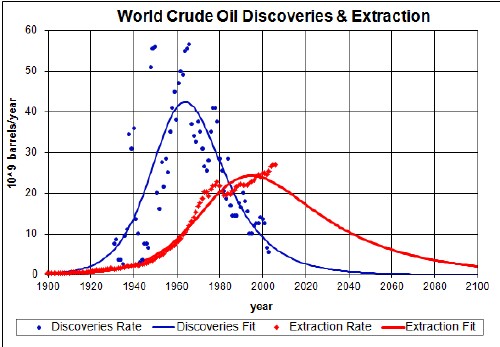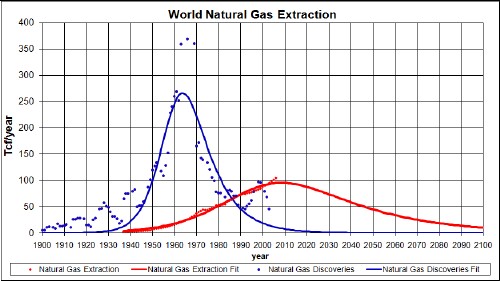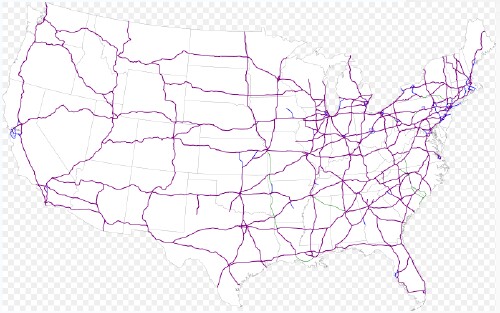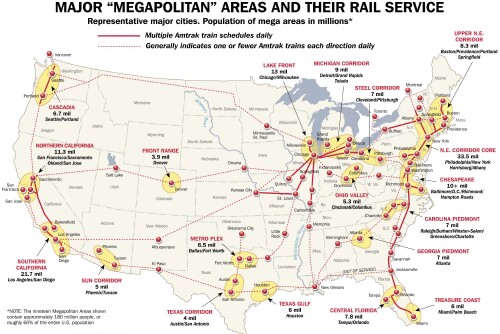
James Howard Kunstler: "...a failure to get comprehensive passenger rail service going will be a sign of how fundamentally unserious we are as a nation." Kunstler states that it is most important to recreate low-speed rail systems in the United States; he states that there may not be enough capital to build a high-speed rail system. I agree that we need to recreate low-speed rail systems between all cities and towns; however, here I support creating high-speed rail between the regions of the United States. If we do not do that, when extensive air travel is no longer viable due to lack of fuel, the United States probably cannot remain as a united country.
It has been a mystery to me that the U.S. Congress has not long ago initiated an extensive project to create an Interstate Railway System (IntRailSys) similar to the Interstate Highway System (IntHighSys) initiated fifty years ago and recently completed.
It is very clear that the world is peaking in crude-oil extraction about now and, therefore, that we must move as quickly as possible toward using electricity for all modes of transportation. We cannot depend on natural gas to fill the gap, as its extraction will peak within the next two decades, even accounting for recent extracton of natural gas from shale. And producing liquid fuels from coal is very problematic environmentally and energetically.


It is also very clear that we must reduce energy usage by increasing efficiency of energy usage as much as possible. Since rail transportation is much more energy efficient than car and truck transportation and since using electric energy is much more efficient for transportation than is using liquid fuels for energy, we must move to electric-car and rail transportation as quickly as possible.
Passenger Mode |
Passengers/vehicle |
MPG/person |
Bicycle |
1 |
650 |
Electric Railroad |
100 |
300 |
Walking |
1 |
235 |
Diesel Railroad |
100 |
235 |
Electric Car |
1 |
125 |
Hybrid Bus |
25 |
100 |
Bus |
25 |
75 |
Hybrid Car |
1 |
45 |
Air |
100 |
30 |
Car |
1 |
25 |
SUV/Pickup |
1 |
15 |
Freight Mode |
BTU/ShortTon/Mile |
Railroad |
341 |
Water |
510 |
Heavy Trucks |
3357 |
Air Freight |
9600 |
These are rough numbers calculated from the link given above.
Of course, another major reason for moving to electric energy for transportation is because doing so will reduce the carbon-dioxide emissions due to burning liquid fuels, even when the electricity is generated by burning coal. Those vehicular emissions are a major cause of global warming.
Most other developed countries have much more extensive and better railways that does the United States. An extensive project to create an Interstate Railway System in the United States would enable us to catch up to those countries to compete with them in the world economy.
The Interstate Highway System now has about 47,000 miles of roads in it. We should aim for at least that total distance for the Interstate Railway System. Many of the branches of the IntRailSys could be beside the IntHighSys or on pillars in the median of the IntHighSys roads. Instead of adding lanes to Interstate Highways we should be converting some of the lanes to electric railways.
The IntHighSys cost $425 billion in 2006 dollars, $125 billion less than the Bush Iraq War up to July 2008. The allocation for the IntRailSys should be about $500 billion over the next ten years. Of course, the IntRailSys needs to be coordinated with the IntHighSys (particularly with regard to electric cars) and the airways.

The IntRailSys should mostly be built from scratch, so that it is not restricted by the poor condition of the existing 177,000 miles of railroads. It must be electric instead of diesel, to make it possible to run by many different energy sources generating the electricity. Long distance runs should be by very fast trains similar to the Shinkansen "Bullet Trains" in Japan or the TGV Trains in France.
Rail Solution in Virginia has proposed a similar "Steel Interstate System", although its main emphasis is improving railways in Virginia, West Virginia, Tennesee and Pennsylvania. Currently it is advocating improving rail routes that are parallel to Interstate highways to reduce truck traffic.
Go21.org is an organization dedicated to increasing use of raiways for freight.
http://en.wikipedia.org/wiki/High_speed_rail:
"High Speed Rail (HSR) is best suited for journeys of 2-3 hours (150-650 km or about 100-400 miles), for which the train can beat both air and car in this range. When traveling less than about 650 km (400 mi), the process of checking in and going through security screening at airports, as well as the journey to the airport itself makes the total air journey time no faster than HSR. However, anecdotally, competition authorities in Europe treat HSR for city pairs as competitive with passenger air at 4-4.5 hours, allowing on a 1-hour flight at least 40 minutes at each point for travel to and from the airport, checkin-security-boarding, disembarcation-baggage retrieval and other waits.
However, unless air travel is severely congested, merely providing a comparable service is often not a compelling financial basis for build an HSR system from scratch. As a rule of thumb, rail journeys need to be four hours or thereabouts to be competitive with air travel on journey time. One factor which may have a further bearing on HSR's competitiveness is the general lack of inconvenience when using HSR, for example the lack of a requirement to check baggage, or repeated queuing for checkin, security and boarding as well as the typically high on-time reliability as compared to air. Separately, from a business traveler's perspective, HSR can offer amenities such as cellular phone network availability and on for example Franco-German TGV-Est wireless internet broadband.
There are routes where high-speed trains have totally beaten air transport, so that there is no air connection anymore. Examples are Paris-Brussels and Cologne-Frankfurt. If the train stops at a big airport, like Paris and Frankfurt, these short distance airplanes lose an extra advantage for the many travellers who want to go to the airport for a long-distance journey. Air plane tickets can include a train segment for the journey, with guaranteed rebooking if the connection is missed, like normal air travel."

Contact your congressional representative and your senators and tell them to get busy developing an Interstate Railway System.
L. David Roper interdisciplinary studies
L. David Roper, http://www.roperld.com/personal/roperldavid.htm; roperld@vt.edu
06-Apr-2016